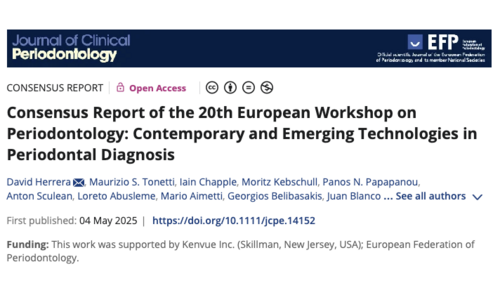![]()
25 May 2025
Outcomes of 20th European Workshop on Periodontology published in JCP
Categories:Institutional, Publications

The Consensus Report of the 20th European Workshop on Periodontology: Contemporary and Emerging Technologies in Periodontal Diagnosis, in now available (open access) in the Journal of Clinical Periodontology. It offers a comprehensive update on diagnostic approaches in periodontology, reflecting the latest research, technologies, and clinical insights.
The report synthesises findings from eight systematic reviews and contributions from 70 leading experts representing 21 countries. It provides timely guidance as clinicians navigate a landscape shaped by rapid technological advances, the integration of the 2018 classification of periodontal diseases, and the increasing focus on diagnosis by global bodies such as the World Health Organization (WHO).
The workshop, organised by the European Federation of Periodontology (EFP) and supported by Kenvue, addressed the full spectrum of periodontal diagnostics: from screening and staging to prognosis, monitoring, and risk prediction. The in-person meeting in November 2024, in La Granja, Segovia, Spain, brought together international researchers and clinicians in three working groups, each exploring a distinct domain of diagnostic innovation.
Manual probing remains key - but is no longer alone
Working Group 1 reaffirmed that manual periodontal probing remains the reference standard for clinical assessment. However, it also highlighted the growing relevance of imaging tools in complementing traditional approaches, particularly in visualising bone loss and identifying disease patterns.
Biomarkers and genetic tests show promise
Working Group 2 explored diagnostic tests based on microbial and host biomarkers, as well as emerging genetic tools. While these methods are not yet routinely used in clinical practice, the group noted their potential for improving personalised care and enabling earlier detection of periodontal diseases.
AI and digital health tools enter the clinical setting
The most future-facing discussions came from Working Group 3, which evaluated the integration of emerging technologies such as artificial intelligence systems (AIS), questionnaire-based risk assessments, and data science-driven platforms. These tools could soon support clinicians in synthesising multiple sources of data to enhance diagnostic precision and patient engagement, both within dental clinics, and in other healthcare settings, including clinics of other medical specialties, or even through the use of a computer or mobile phone.
“The message from this consensus is clear: while manual probing remains foundational, we are entering an era where multiple sources of information, data modalities and applied data science methods - including AI - will work together to support better outcomes,” said Prof David Herrera, chair of the workshop and main author of the report. “It’s an exciting time for periodontology, and we must ensure that these advances are used in ways that are evidence-based, patient-centred, and clinically meaningful.”
As oral health professionals seek to stay ahead of innovation, this consensus report is a valuable reference to inform clinical decision-making and future research. It also underscores the importance of interdisciplinary collaboration in shaping the next generation of diagnostic tools.




